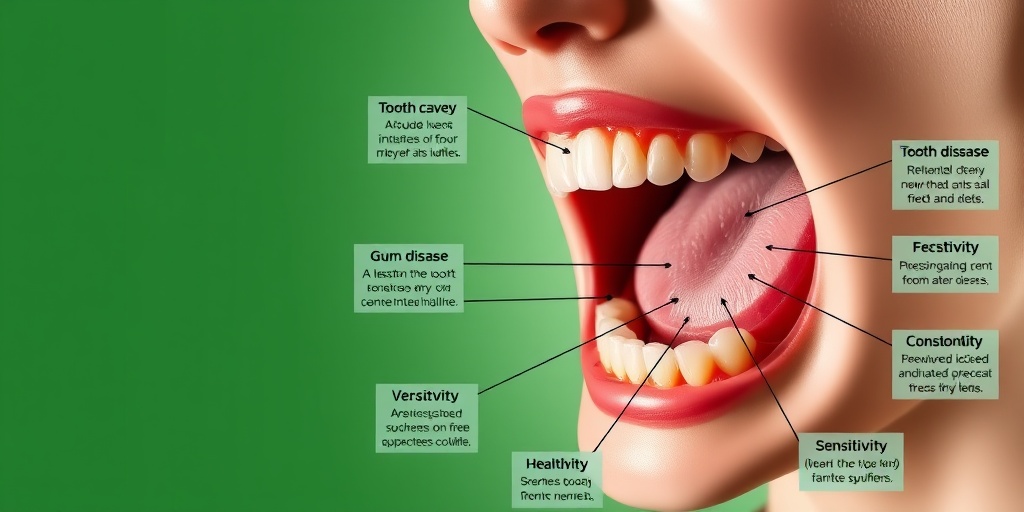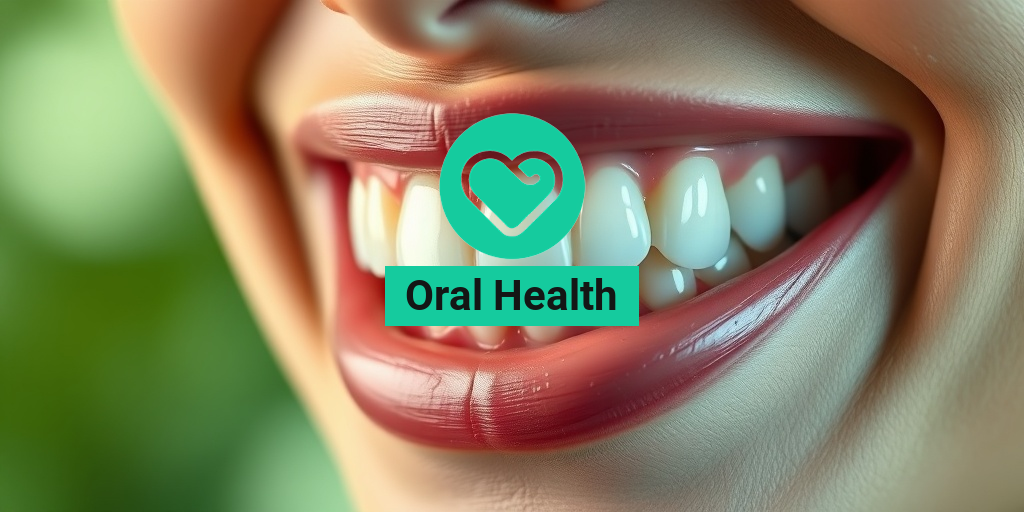What Is Oral Health?
Oral health refers to the overall health of your mouth, teeth, gums, and the surrounding structures. It encompasses a variety of factors, including the absence of disease, the ability to chew and speak comfortably, and the maintenance of good hygiene practices. Oral health is not just about having a bright smile; it plays a crucial role in your overall well-being.
The Components of Oral Health
Understanding oral health involves recognizing its key components:
- Teeth: Healthy teeth are essential for proper chewing and speaking. They should be free from cavities and decay.
- Gums: Healthy gums are firm and pink, without signs of inflammation or bleeding.
- Mouth: A healthy mouth is free from sores, lesions, and infections.
- Breath: Fresh breath is a sign of good oral hygiene and health.
In essence, oral health is a reflection of how well you care for your mouth and the preventive measures you take to avoid diseases such as oral cancer and gum disease.
What Affects Oral Health?
Several factors can influence your oral health, including:
- Diet: A balanced diet rich in vitamins and minerals supports healthy teeth and gums.
- Hygiene Practices: Regular brushing and flossing are vital for maintaining good oral hygiene.
- Regular Check-ups: Visiting an oral health clinic for routine check-ups can help catch issues early.
- Habits: Smoking and excessive alcohol consumption can negatively impact oral health.
Importance of Oral Health
The significance of oral health extends beyond just having a beautiful smile. It is integral to your overall health and quality of life. Here are some reasons why maintaining good oral health is essential:
Connection to Overall Health
Research has shown that poor oral health can lead to serious health issues, including heart disease, diabetes, and respiratory infections. The mouth serves as a gateway to the body, and bacteria from gum disease can enter the bloodstream, affecting other organs. Therefore, prioritizing oral health care is crucial for preventing systemic diseases.
Impact on Mental Health
Oral health also plays a significant role in mental well-being. Issues such as bad breath, tooth decay, or missing teeth can lead to low self-esteem and social anxiety. Maintaining good oral hygiene can boost your confidence and improve your interactions with others.
Economic Benefits
Investing in oral health services can save you money in the long run. Preventive care, such as regular dental check-ups and cleanings, can help avoid costly procedures like oral surgery or extensive treatments for advanced dental issues. By taking care of your teeth and gums, you can minimize the risk of serious problems that require expensive interventions.
Community and School Oral Health
Promoting community oral health initiatives and school oral health programs is vital for fostering good habits from a young age. Education about oral hygiene and regular screenings can significantly reduce the prevalence of dental issues in children, setting them up for a lifetime of healthy habits.
World Oral Health Day
Celebrated annually on March 20th, World Oral Health Day raises awareness about the importance of oral hygiene and encourages people to take action for better oral health. This day serves as a reminder to prioritize your dental care and educate others about the significance of maintaining good oral health.
In conclusion, oral health is a vital aspect of overall well-being that should not be overlooked. By understanding its meaning and importance, you can take proactive steps to ensure your mouth remains healthy. For more information and resources on oral health, consider visiting Yesil Health AI, where you can find evidence-based answers to your health questions. Remember, a healthy mouth leads to a healthier you! 😁🦷

Common Oral Health Issues
Maintaining oral health is crucial for overall well-being, yet many people face various oral health issues throughout their lives. Understanding these common problems can help you take proactive steps to prevent them. Here are some of the most prevalent oral health issues:
Cavities
Cavities, also known as dental caries, are one of the most common oral health problems. They occur when bacteria in the mouth produce acids that erode tooth enamel. If left untreated, cavities can lead to severe pain and tooth loss. Regular dental check-ups and good oral hygiene practices, such as brushing twice a day and flossing, can help prevent cavities.
Gum Disease
Gum disease, or periodontal disease, is another widespread issue affecting many adults. It begins with gingivitis, characterized by swollen and bleeding gums. If not addressed, it can progress to periodontitis, which can result in tooth loss. Maintaining proper oral health care and visiting an oral health clinic regularly can help manage and prevent gum disease.
Oral Cancer
Oral cancer is a serious condition that can affect any part of the mouth, including the lips, gums, and tongue. Risk factors include tobacco use, excessive alcohol consumption, and HPV infection. Regular screenings at an oral health center can help detect oral cancer early, improving treatment outcomes.
Tooth Sensitivity
Tooth sensitivity is a common complaint, often triggered by hot, cold, or sweet foods and beverages. It can result from worn enamel, gum recession, or cavities. If you experience sensitivity, consult an oral health therapist for advice on managing this discomfort.
Bad Breath
Halitosis, or bad breath, can be caused by various factors, including poor oral hygiene, dry mouth, or underlying health conditions. Maintaining a consistent oral care routine and staying hydrated can help combat bad breath. If the problem persists, consider visiting an oral health group for further evaluation.
Oral Health Symptoms
Recognizing the symptoms of oral health issues is essential for early intervention and treatment. Here are some common symptoms to watch for:
Bleeding Gums
Bleeding gums, especially during brushing or flossing, can be a sign of gum disease. If you notice this symptom, it’s crucial to improve your oral hygiene practices and consult a dental professional for an oral health assessment.
Persistent Toothache
A toothache that lasts more than a day or two may indicate a cavity, infection, or other dental issues. Don’t ignore this symptom; seek help from an oral surgeon or dentist to determine the cause and receive appropriate treatment.
Changes in Oral Tissue
Any unusual changes in the tissues of your mouth, such as lumps, sores, or white patches, should be evaluated by a healthcare professional. These changes can be symptoms of oral cancer or other serious conditions.
Dry Mouth
Dry mouth, or xerostomia, can lead to difficulties in speaking, swallowing, and tasting food. It can be caused by medications, certain health conditions, or dehydration. If you experience dry mouth regularly, consider discussing it with your dentist, as they can recommend oral health therapy options.
Difficulty Chewing or Swallowing
If you find it painful or difficult to chew or swallow, it may indicate an underlying oral health issue. This symptom warrants a visit to an oral health clinic for a thorough examination.
By being aware of these common oral health issues and their symptoms, you can take proactive steps to maintain your oral health. Regular dental visits and good oral hygiene practices are essential for preventing and addressing these concerns. Remember, your mouth is a window to your overall health! 🦷✨

Causes of Poor Oral Health
Maintaining oral health is crucial for overall well-being, yet many individuals struggle with various dental issues. Understanding the causes of poor oral health can help in preventing these problems and promoting better hygiene practices. Here are some of the primary factors that contribute to poor oral health:
Poor Oral Hygiene Practices
One of the most significant causes of poor oral health is inadequate oral hygiene. Failing to brush and floss regularly can lead to the buildup of plaque, which can cause cavities and gum disease. The American Dental Association recommends brushing twice a day and flossing daily to maintain optimal oral hygiene.
Unhealthy Diet
Your diet plays a vital role in your oral health. Consuming excessive amounts of sugary foods and beverages can lead to tooth decay. Foods high in acidity can also erode tooth enamel, making teeth more susceptible to cavities. A balanced diet rich in fruits, vegetables, and whole grains can significantly improve your oral health.
Tobacco Use
Using tobacco products, whether smoking or chewing, has detrimental effects on oral health. Tobacco can lead to gum disease, tooth loss, and even oral cancer. Quitting tobacco can greatly enhance your oral health and reduce the risk of serious dental issues.
Medical Conditions
Certain medical conditions can adversely affect oral health. For instance, diabetes can lead to gum disease, while conditions like dry mouth can increase the risk of cavities. Regular check-ups with your healthcare provider can help manage these conditions and their impact on your oral health.
Neglecting Regular Dental Visits
Many people avoid visiting the dentist due to fear, cost, or lack of time. However, regular dental check-ups are essential for early detection and treatment of potential issues. Dental professionals can provide oral health assessments and recommend necessary treatments to maintain your oral health.
Oral Health Care Tips
Taking proactive steps to care for your oral health can prevent many dental issues. Here are some effective oral health care tips to keep your smile bright and healthy:
Brush and Floss Regularly
As mentioned earlier, brushing your teeth at least twice a day and flossing daily is crucial. Use fluoride toothpaste and a soft-bristled toothbrush to effectively remove plaque and food particles. Don’t forget to replace your toothbrush every three to four months! 🪥
Maintain a Balanced Diet
Incorporate foods that promote oral health into your diet. Crunchy fruits and vegetables like apples and carrots can help clean your teeth naturally. Dairy products are rich in calcium, which strengthens teeth, while nuts and seeds provide essential nutrients for gum health.
Stay Hydrated
Drinking plenty of water is essential for maintaining oral hygiene. Water helps wash away food particles and bacteria, reducing the risk of cavities and gum disease. Additionally, staying hydrated can help combat dry mouth, a condition that can lead to various oral health issues.
Limit Sugary and Acidic Foods
While it’s okay to indulge occasionally, try to limit your intake of sugary and acidic foods. If you do consume them, rinse your mouth with water afterward to help neutralize acids and wash away sugars. 🍭
Use Mouthwash
Incorporating an antimicrobial mouthwash into your routine can provide additional protection against plaque and gingivitis. Look for mouthwashes that contain fluoride for added benefits. This can be especially helpful for those who are prone to gum disease or have had oral surgery.
Regular Dental Check-ups
Make it a habit to visit your dentist at least twice a year for check-ups and cleanings. These visits are crucial for early detection of any potential issues and for receiving professional cleaning that can help maintain your oral health.
By understanding the causes of poor oral health and implementing these care tips, you can take significant steps towards achieving and maintaining a healthy smile. Remember, your oral health is an essential part of your overall health! 😁

Oral Health and Diet
Your oral health is intricately linked to your diet. What you eat not only affects your overall health but also plays a crucial role in maintaining a healthy mouth. Understanding the relationship between diet and oral health can help you make better choices for your teeth and gums.
The Impact of Sugar on Oral Health
One of the most significant dietary factors affecting oral health is sugar. Foods high in sugar can lead to the development of cavities and tooth decay. When sugar is consumed, it interacts with the bacteria in your mouth, producing acids that erode tooth enamel. To protect your teeth, consider reducing your intake of sugary snacks and beverages. Instead, opt for healthier alternatives like:
- Fruits: Apples, pears, and berries are not only delicious but also help stimulate saliva production, which is essential for neutralizing acids.
- Nuts: Almonds and walnuts are low in sugar and high in nutrients that support oral health.
- Vegetables: Crunchy veggies like carrots and celery can help clean your teeth naturally.
Foods That Promote Oral Health
Incorporating certain foods into your diet can significantly enhance your oral hygiene. Here are some foods that are beneficial for your teeth:
- Dairy Products: Cheese, yogurt, and milk are rich in calcium and phosphates, which help strengthen tooth enamel.
- Leafy Greens: Spinach and kale are packed with vitamins and minerals that promote healthy gums.
- Whole Grains: Foods like brown rice and whole-grain bread provide essential nutrients without the added sugars found in processed foods.
Hydration and Oral Health
Staying hydrated is vital for maintaining good oral health. Water helps wash away food particles and bacteria, reducing the risk of cavities and gum disease. Additionally, drinking fluoridated water can provide extra protection against tooth decay. Aim to drink at least 8 glasses of water a day to keep your mouth healthy and hydrated! 💧
Regular Dental Checkups
One of the cornerstones of maintaining excellent oral health is scheduling regular dental checkups. These visits are essential for preventing oral diseases and ensuring that any potential issues are addressed promptly.
The Importance of Preventive Care
Regular dental checkups allow your dentist to perform essential preventive care, including:
- Oral Health Assessments: Dentists can evaluate your overall oral health, checking for signs of cavities, gum disease, and other issues.
- Professional Cleanings: Even with good oral hygiene practices at home, plaque and tartar can build up over time. Professional cleanings help remove these deposits, reducing the risk of decay and gum disease.
- Early Detection: Regular visits enable early detection of potential problems, such as oral cancer or other serious conditions, which can be treated more effectively when caught early.
How Often Should You Visit the Dentist?
Most dental professionals recommend visiting the dentist at least twice a year for checkups and cleanings. However, individuals with specific oral health concerns may need to schedule more frequent visits. Your dentist can provide personalized recommendations based on your unique needs.
What to Expect During a Dental Checkup
During a typical dental checkup, you can expect the following:
- Medical History Review: Your dentist will ask about your medical history and any changes since your last visit.
- Oral Examination: A thorough examination of your teeth, gums, and mouth will be conducted to identify any issues.
- X-rays: If necessary, X-rays may be taken to get a clearer picture of your oral health.
- Cleaning: A dental hygienist will perform a professional cleaning, removing plaque and tartar buildup.
Regular dental checkups are a vital part of maintaining your oral health. By prioritizing these visits, you can ensure that your smile remains bright and healthy for years to come! 😁

Frequently Asked Questions about Oral Health
What is Oral Health?
Oral health refers to the overall health of your mouth, teeth, gums, and related structures. It encompasses everything from proper oral hygiene practices to the prevention and treatment of oral diseases.
Why is Oral Health Important?
Maintaining good oral health is crucial not only for a beautiful smile but also for overall health. Poor oral hygiene can lead to issues such as cavities, gum disease, and even systemic health problems like heart disease.
What are the Best Practices for Oral Hygiene?
- Brush your teeth at least twice a day with fluoride toothpaste.
- Floss daily to remove plaque and food particles between teeth.
- Visit your dentist regularly for check-ups and cleanings.
- Limit sugary foods and drinks to reduce the risk of cavities.
- Use mouthwash to help reduce plaque and prevent gum disease.
What Services are Offered at an Oral Health Clinic?
An oral health clinic typically offers a range of services, including:
- Routine dental check-ups and cleanings
- Oral surgery for extractions and other procedures
- Orthodontic assessments and treatments
- Oral health education and preventive care
- Management of oral diseases and conditions
What is Oral Health Education?
Oral health education involves teaching individuals about the importance of maintaining good oral hygiene and the impact of oral health on overall well-being. This education can take place in schools, community programs, and health centers.
How Can I Assess My Oral Health?
You can assess your oral health by regularly checking for signs of gum disease, cavities, or other issues. Additionally, using an oral health assessment tool can help you evaluate your oral hygiene practices and identify areas for improvement.
What is World Oral Health Day?
World Oral Health Day is celebrated annually on March 20th to raise awareness about the importance of oral health and promote good oral hygiene practices globally. The next observance will be on World Oral Health Day 2025.
Can Oral Health Affect Overall Health?
Yes, there is a strong connection between oral health and overall health. Poor oral hygiene can lead to serious health issues, including heart disease, diabetes, and respiratory infections. Maintaining good oral health is essential for preventing these complications.
What Role Does an Oral Health Therapist Play?
An oral health therapist is a trained professional who provides preventive and therapeutic oral health services, focusing on maintaining and improving patients’ oral health through education, assessment, and treatment.
Are There Probiotics for Oral Health?
Yes, oral health probiotics can help maintain a healthy balance of bacteria in the mouth, potentially reducing the risk of cavities and gum disease. These probiotics can be found in certain foods and supplements.
How Can Schools Promote Oral Health?
Schools can promote oral health by incorporating oral health education into their curriculum, providing access to dental care services, and organizing events like oral health day activities to raise awareness among students.




